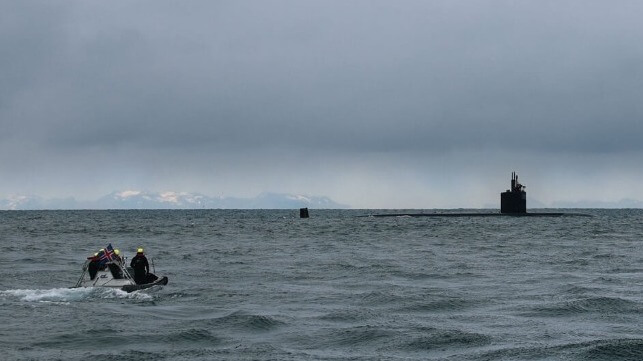Iceland Allows Resupply Call for U.S. Nuclear Sub for the First Time

The Los Angeles-class fast-attack submarine USS San Juan has become the first U.S nuclear-powered ship to sail into Iceland’s territorial waters after the Nordic nation temporarily waived a longtime ban.
U.S. Sixth Fleet announced that the submarine made a brief stop for supplies and personnel off Iceland’s west coast while operating in the High North on April 26. It said that the visit is part of an effort to increase regional maritime domain awareness and the safety of underwater infrastructure, such as submarine cables. More importantly, it paves the way for future stops as needed.
The submarine’s stopover in Iceland came a week after the nation’s government said it will authorize U.S nuclear-powered submarines to make brief service visits off its coast. This marks the first time ever Iceland has allowed U.S nuclear powered submarines in its territorial waters.
“We thank our Icelandic allies for allowing San Juan to conduct this brief stop for supplies and personnel in Icelandic waters,” said Capt. John Craddock, Commander Task Force 69.
He added that the visit demonstrates the strength of the Iceland-U.S. strategic relationship and the two nations mutual commitment to maritime domain awareness and increased response capabilities in the Arctic and North Atlantic. “The ability to conduct these stops out of Iceland greatly increases our operational flexibility in the Greenland-Iceland-U.K. Gap.”
In allowing the visit, Iceland Foreign Ministry emphasized that the submarine will be serviced a few kilometers off the coast, will not carry nuclear weapons and will not make port calls.
“It is a condition for the arrival of allied warships in the country that the governments of the respective countries both know and respect the provisions of Iceland’s national security policy that Iceland, and its territorial waters are declared free from nuclear weapons,” said Iceland Foreign Ministry in a statement.
While the country has given the nod for the first access to its waters, it has maintained that any frequency of visits will depend on the need at any given time.
Though its neighboring NATO members have always allowed allied nuclear-powered submarines to sail into their territorial waters, Iceland has maintained a tough stance against any visits owing to its uncompromising opposition to nuclear energy and weapons.
Iceland is softening its tough stance while hosting Dynamic Mongoose 2023, a large-scale anti-submarine warfare exercise that started in the North Atlantic on April 24 and runs through May 5. A total of 15 warships from 10 allied nations are participating in the exercise.
The security situation in the North Atlantic area has become a top priority for Iceland following Russia’s invasion of Ukraine. The waters around Iceland are a strategic zone for submarine activity, particularly Russian Navy subs coming from the Barents Sea.

that matters most
Get the latest maritime news delivered to your inbox daily.
Iceland is also a hub for several subsea telecom cables, and the security of subsea infrastructure is at top of mind for NATO. Just last week, a joint report by public broadcasters in Denmark, Norway, Finland and Sweden revealed that Russia has deployed a covert fleet of trawlers and research ships to identify vulnerabilities in the subsea cable network off the coasts of NATO nations. The report detailed a large-scale surveillance operation targeting key communications and electrical transmission infrastructure in the Baltic, the North Sea and the Norwegian Sea.
Concerns that Russia is planning to sabotage critical infrastructures have seen Iceland deepen its bilateral cooperation with the U.S, with the two countries annual Strategic Dialogue taking place in Washington last week. Iceland, with a population of 370,000, does not have an army and only operates a coastguard unit. The country also has an air defense and surveillance system that is integrated into NATO.
